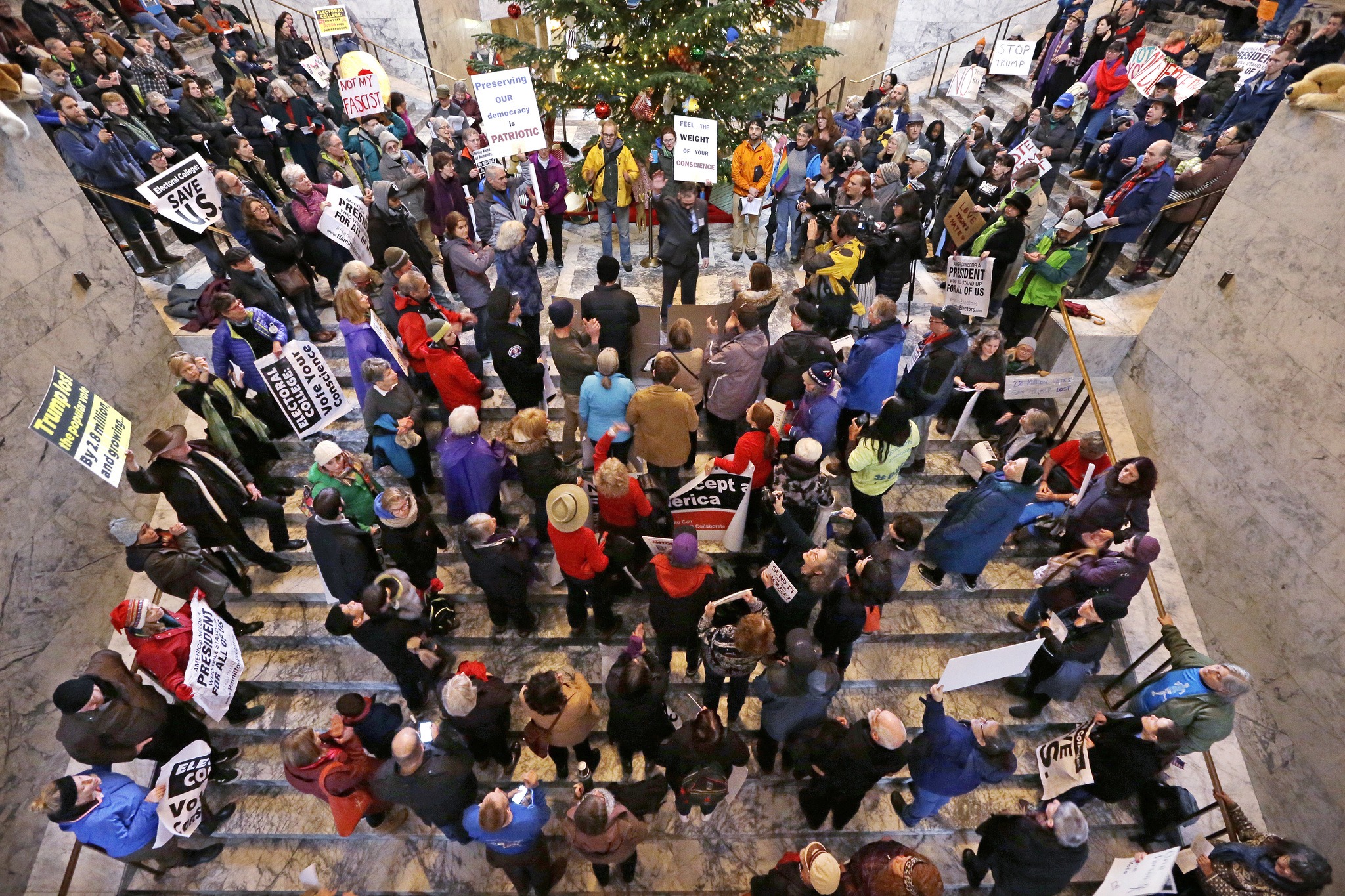OLYMPIA — For the first time in four decades, members of the Electoral College in Washington state have broken from the state’s popular vote for president, with four electors casting their votes for candidates other than Democrat Hillary Clinton.
Clinton got eight votes, while former Secretary of State Colin Powell got three and Native American tribal leader Faith Spotted Eagle got one vote.
Esther John, 64, said she had struggled with her decision for weeks, but she decided to cast her presidential vote for Powell “in the hopes that Democrats and Republicans could reconcile.”
“Colin Powell is beloved by so many people and respected by so many people,” said John, who cast her vice presidential vote for Maine Republican U.S. Sen. Susan Collins.
Elector Dan Carpita, who played a native flute and gave a blessing before the vote, cast his vote for Clinton and said that he was saddened that there were some who did not do so.
“A vote for anyone other than Hillary was a vote for Trump,” he said.
Carpita, a member of the Lemhi-Shoshone tribe, said that he hoped that this was the last presidential election to be decided by the Electoral College, citing Clinton’s popular vote lead over Trump.
“We can’t say to 2.8 million people your vote doesn’t count,” he said. “That’s not the American way. It’s not democracy.”
Elector Bret Chiafalo, who earlier in the day said he planned to vote for Republican Ohio Gov. John Kasich, said he ultimately changed his vote to Powell after conversations with the other two electors who cast their votes for Powell, John and Levi Guerra.
Robert Satiacum, a member of the Puyallup Tribe who had supported Vermont Sen. Bernie Sanders, cited environmental concerns as to why he cast his vote for Spotted Eagle.
“It’s all about the water,” said Satiacum, who cast his vice presidential vote for Native American and environmental activist Winona LaDuke.
“We need leaders who understand that.”
The last time an elector broke from the popular vote in the state was in 1976, when Mike Padden of Spokane Valley, who is currently a Republican state senator, voted for Ronald Reagan in 1976 instead of Gerald Ford, who had won the state.
In last month’s election, Republican Trump won 306 electoral votes to Clinton’s 232, though Clinton’s tally will now be lower.
A candidate needs 270 electoral votes to win, which Trump surpassed Monday afternoon.
A group called the Hamilton Electors, co-founded by Chiafalo, had sought to block Trump by encouraging both Democratic and Republican electors in every state to unite behind an alternate Republican candidate.
The penalty in Washington state for so-called “faithless electors” is a fine of up to $1,000. Efforts by two Democratic electors from Washington state to avoid being fined if they ignore the results of the state’s popular vote were rejected by federal courts last week.
The fine — which has never previously been imposed — was first established by the state Legislature following Padden’s vote in 1976. David Ammons, a spokesman for Secretary of State Kim Wyman, said that a civil penalty will be imposed, but that the details were currently being worked out with the attorney general’s office.
Hundreds of protesters gathered at the Capitol ahead of the vote, many carrying signs, including those that read “Not My President” and “Love Trumps Hate.”
One protester was dressed like a giant Donald Trump, wearing a king’s crown.
The Electoral College was devised at the Constitutional Convention in 1787. It was a compromise between those who wanted popular elections for president and those who wanted no public input.
The Electoral College has 538 members, with the number allocated to each state based on how many representatives it has in the House plus one for each senator. The District of Columbia gets three, despite the fact that the home to Congress has no vote in Congress.
Congress will officially tally the state votes Jan. 6, and the presidential inauguration will be Jan. 20.
